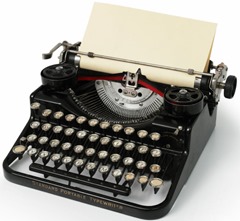 Is the recent mania for typewriters and typewriter-like writing tools writing’s equivalent to the “smell of books” preference for paper over e-books? It seems like a reasonable theory to me.
Is the recent mania for typewriters and typewriter-like writing tools writing’s equivalent to the “smell of books” preference for paper over e-books? It seems like a reasonable theory to me.
Tor.com has an interesting article looking at the resurgence of the humble typewriter in recent years. Writer Frederic S. Durbin discusses coming to typewriters at an early age, thanks to a largely-unused 1930s-vintage L.C. Smith typewriter in the home where he grew up.
Right about the time he graduated from college, the advent of the word processor brought new abilities to correct and revise your work before committing it to paper. At the time, Durbin was sold on the new tools, but now he finds himself returning to the humble typewriter—along with many other writers.
Typewriters are making a return these days. They’re becoming highly fashionable to have around as decorations, but even more, many more people are getting and using them for writing. “Hipsters are nearly as likely to be toting a portable Remington as a Mac, and people of all descriptions are tapping away from park benches. Preteens ask Santa Claus for typewriters.” Durbin calls it an “insurgency,” after Richard Polt’s The Typewriter Revolution: A Typist’s Companion for the 21st Century.
Durbin goes on to wax eloquent at great length about the benefits of the humble typewriter to writing, and the funny thing is to me, some of them sound very similar to reasons to prefer a paper book over an e-book. You don’t have notifications popping up to distract you while you’re writing; they don’t need electricity so you can use them even in a power outage, or somewhere with no handy power outlets.
Others sound a little more similar to the “smell of books” argument. Such as, the way they force you to think about what you’re writing before you write it, because you can’t go back and edit it afterward. While it’s true that’s something typewriters have in spades, it seems to me that if you want that kind of thing there are surely a number of word processing apps you can get that will simulate it for you. There’s no reason to set up with an antique for it.
(Though, thinking about it, it does cast the Freewrite’s curious inability to edit what you’ve written in a whole new light. If you consider that it’s trying to be an electronic implementation of a manual typewriter in all aspects, rather than a full-featured word processor, it makes perfect sense. Perhaps Durbin would be right at home with a Freewrite in a write-in-your-head sense.)
It all seems a little silly on first glance, but perhaps there’s something to it on second look. People do get different things out of books they consume in different ways, whether as print, e-book, or audiobook. It stands to reason writers might get different things out of writing in different ways, too. And that’s the reason behind the recent spate of minimalist word-processing applications, as well as tools like the Freewrite.
I’m as fond of portable writing as anybody else—I wrote this blog post on my Nexus 7 with a Bluetooth keyboard, sitting at a table in a local breakfast café—but it seems like using a typewriter portably would be a bridge too far for me. But then, I can’t imagine being one of the “smell of books” crowd, either. However, I don’t have to. In both cases, peoples’ individual preferences make sense to them, and more power to them. They don’t have to make sense to me.
































There’s an old Jack Benny radio skit that goes like this:
[Sound of footsteps echoing in an alley.]
Voice: “Halt, your money or your life.”
[Silence]
Voice more irritated: “Your money or your life!”
Jack Benny: “I’m thinking. I’m thinking.”
——
I’d feel much the same if the question were “Write with a typewriter or your life.” It’d be almost that hard a decision.
That said, if you’re like Isaac Asmov and your first draft is your final, then a typewriter will serve almost all as well as a computer. The downside is your writing may sound like Asmov’s, meaning, in my humble opinion, lacking in polish.
I did a little writing on a typewriter before I got my first Kaypro back when dinosaurs roamed the earth. I was quite happy to leave that behind. Revisions are a pain.
The retro attitude for typewriters may impact some people for the same reason that others prefer the smell of printed books. They just like old.
But there’s the differing point of view that ebooks only make sense for read once and discard books. For serious topics, ebooks are unsubstantial. Print is better. You can find it in a few minutes, even if you bought it 20 years ago. I’m not sure I’d have an easy time finding an ebook I bought just a few weeks ago.
You don’t have notifications popping up to distract you while you’re writing [on a typewriter].
Nor do I have any notifications popping up when I type on my PC. It isn’t that difficult to arrange.
I have a typewriter that my parents gave me- a sturdy reconditioned one- when I was in high school. I haven’t used it in 20 years. Writing is much easier for me on a computer, given the ease of editing.
In some instances, old is better. For example, a vegetable peeler I purchased 20+ years ago is much sharper than a number of vegetable peelers I have purchased since then.